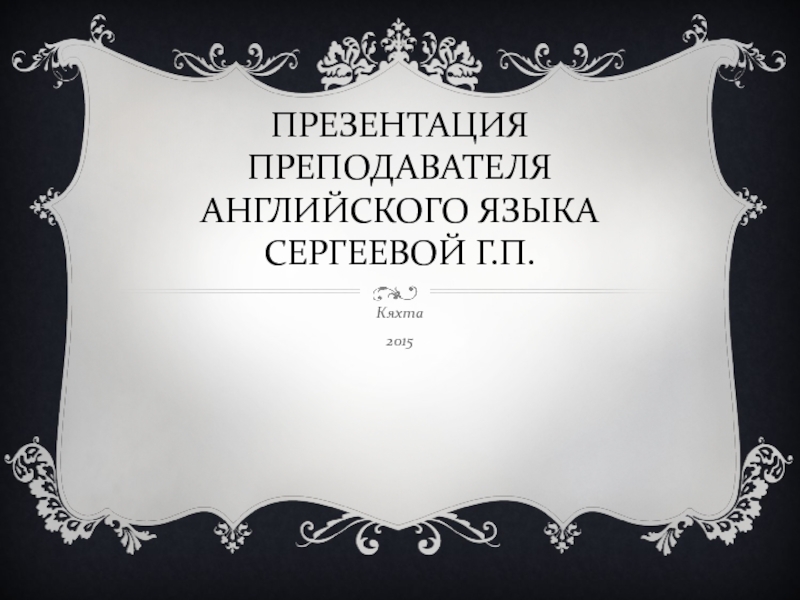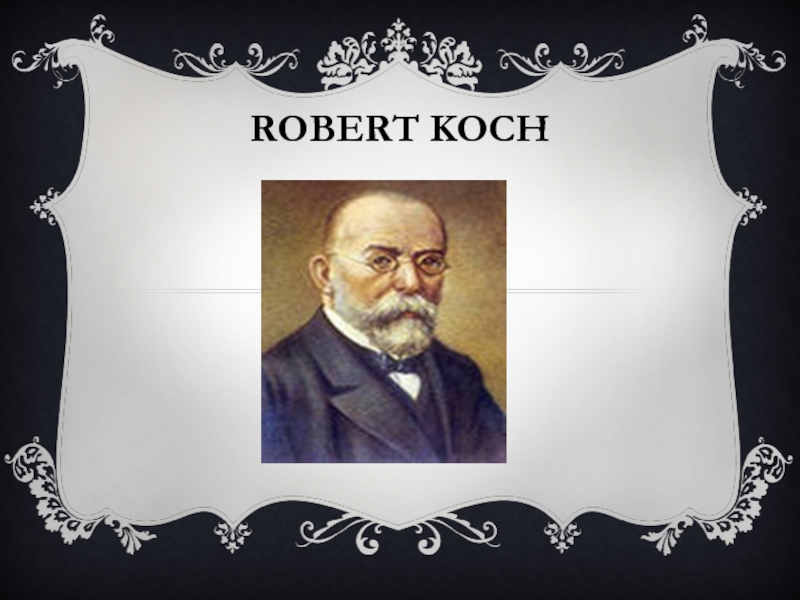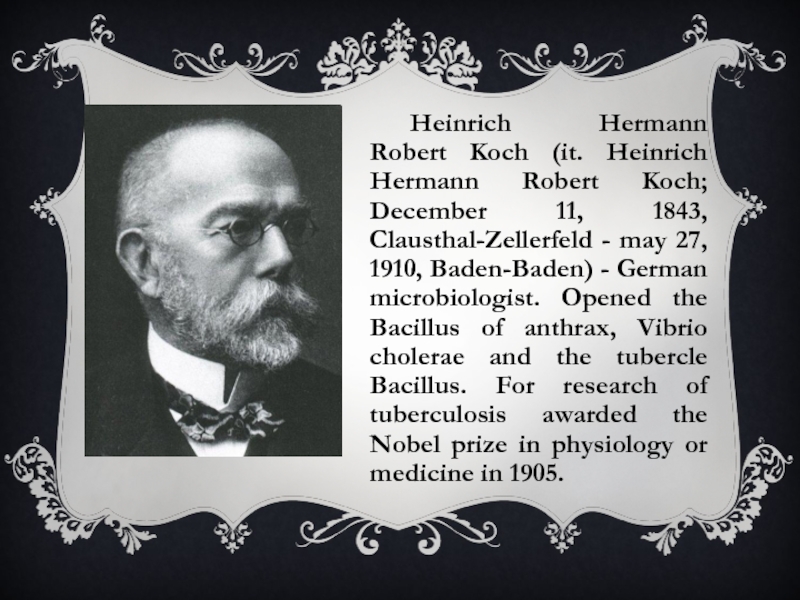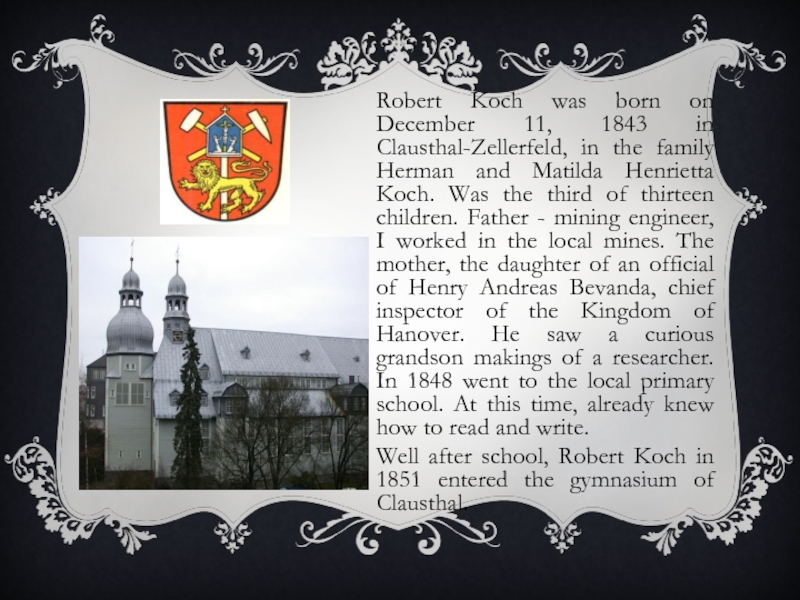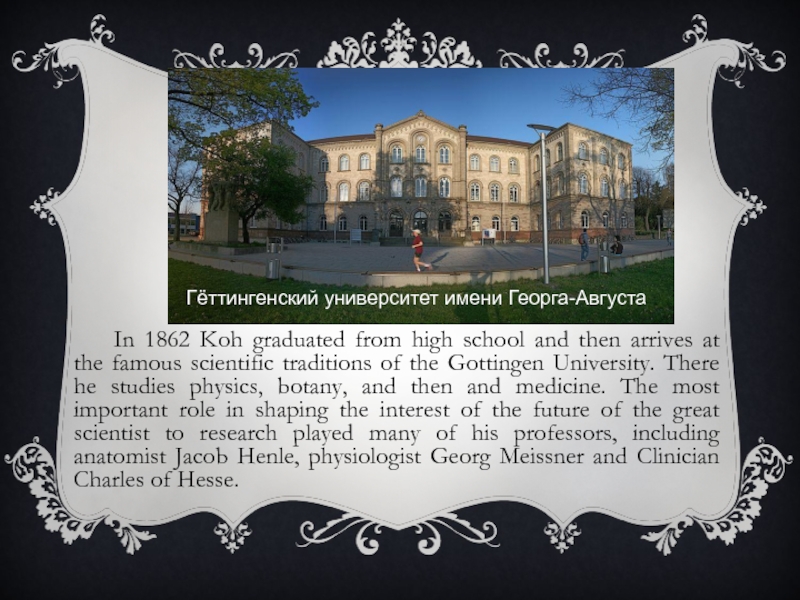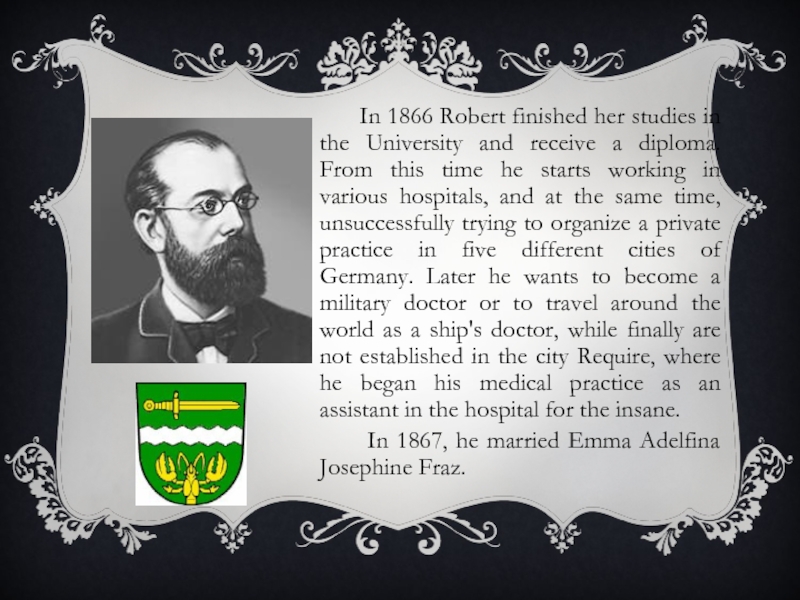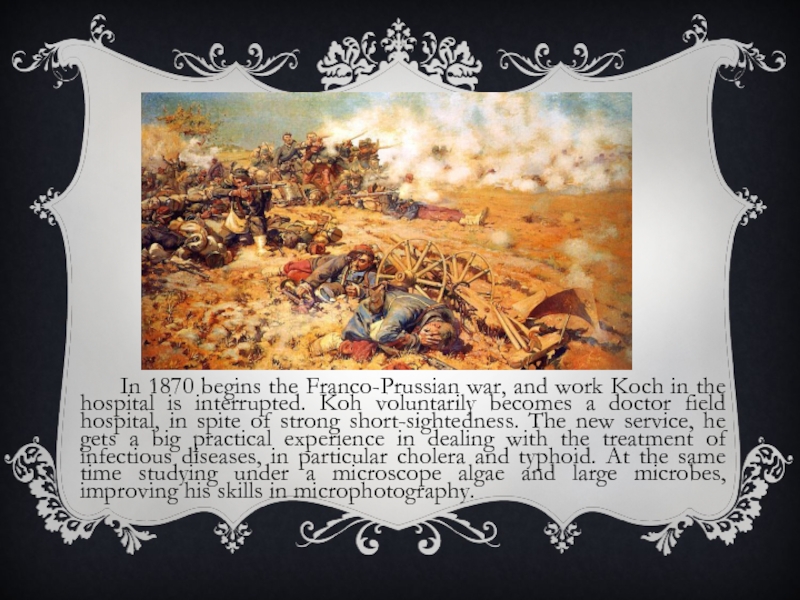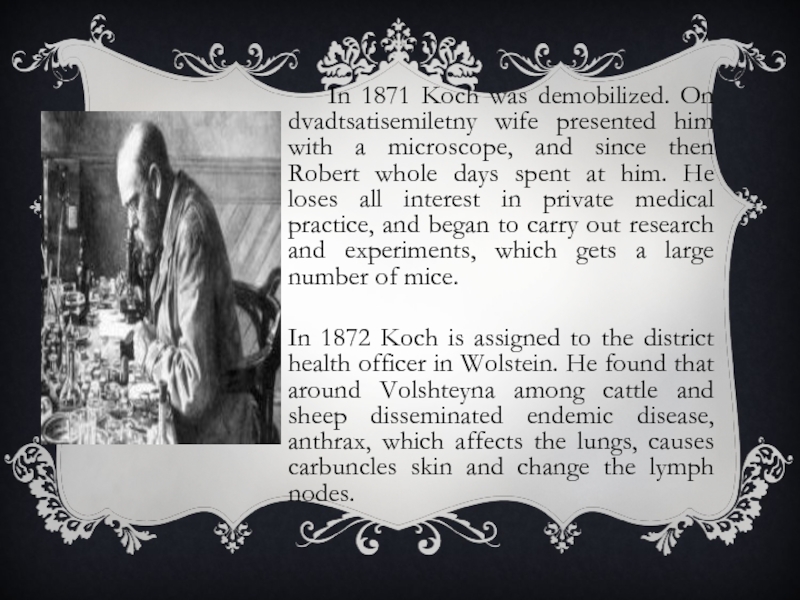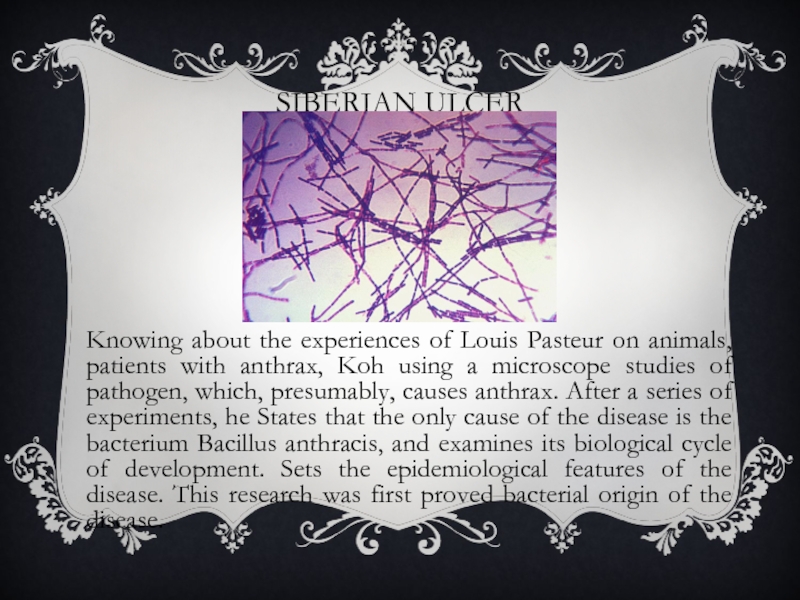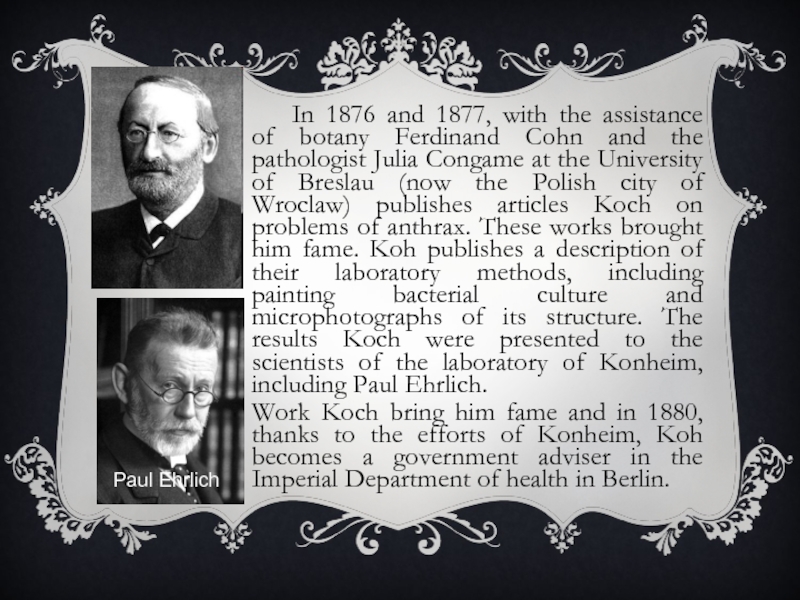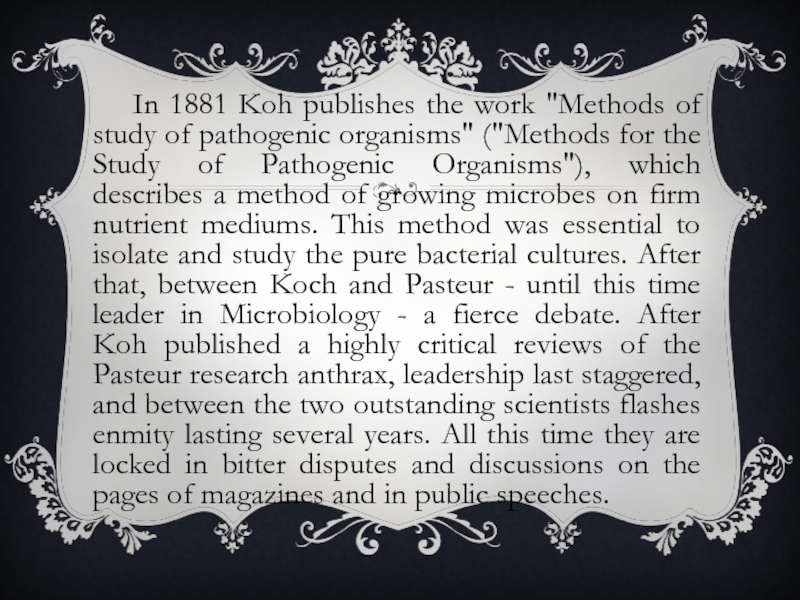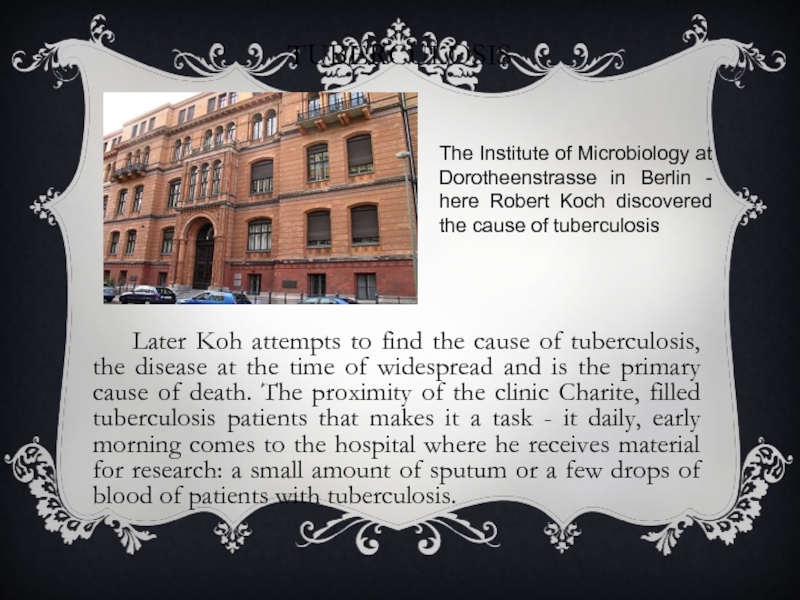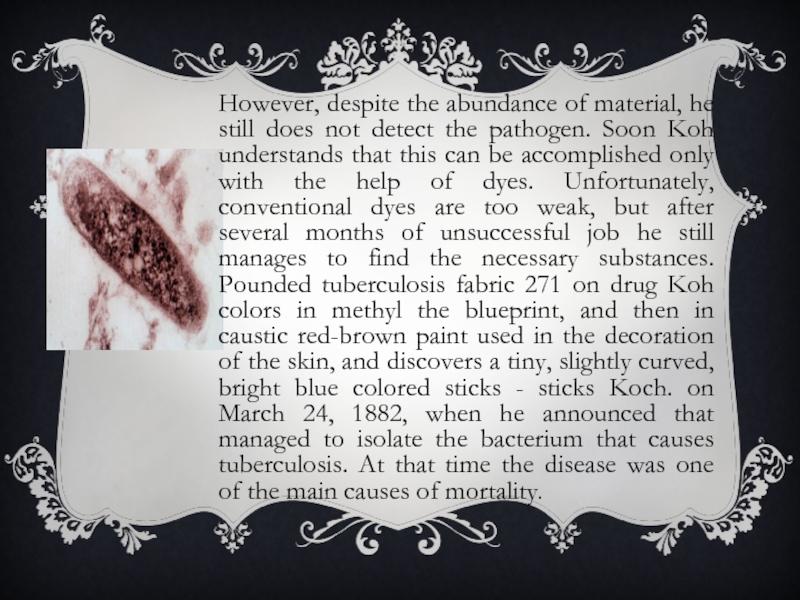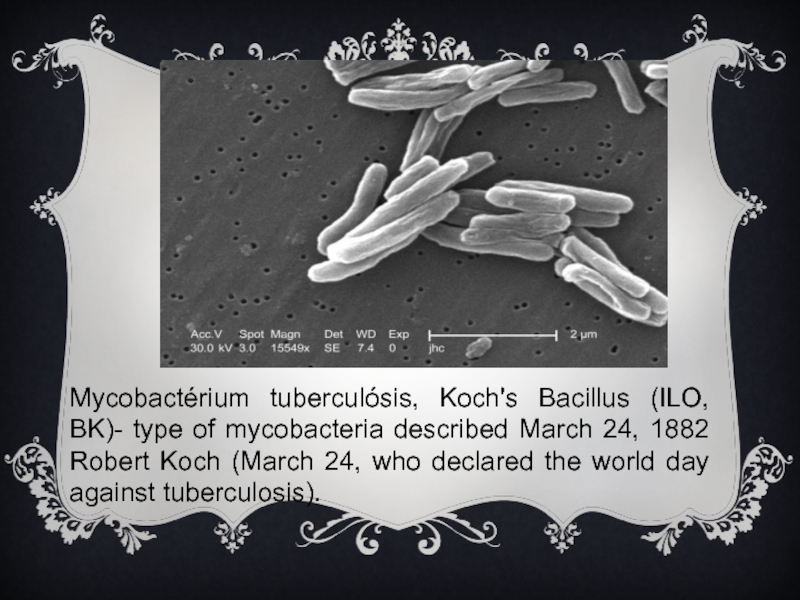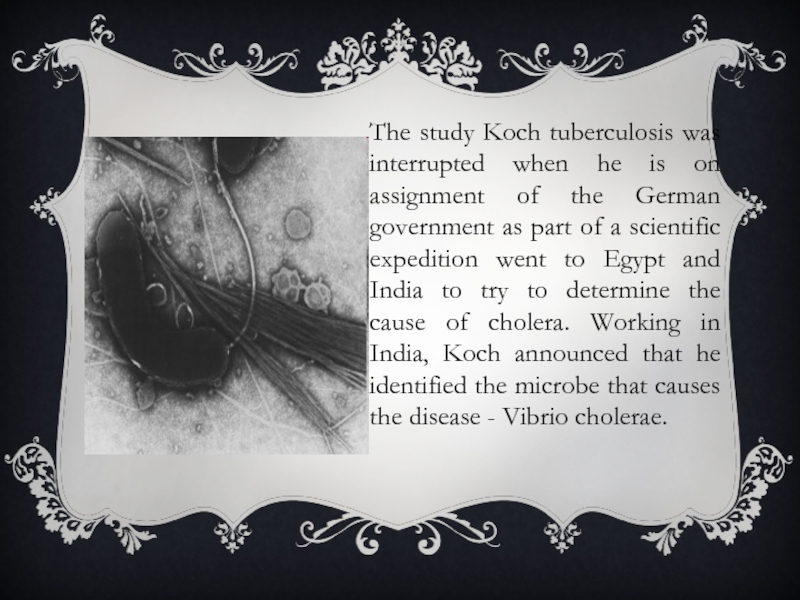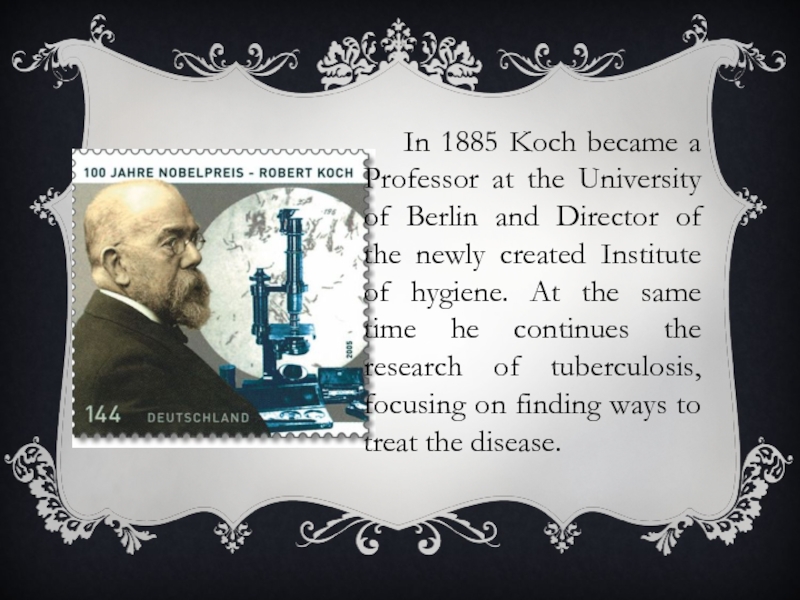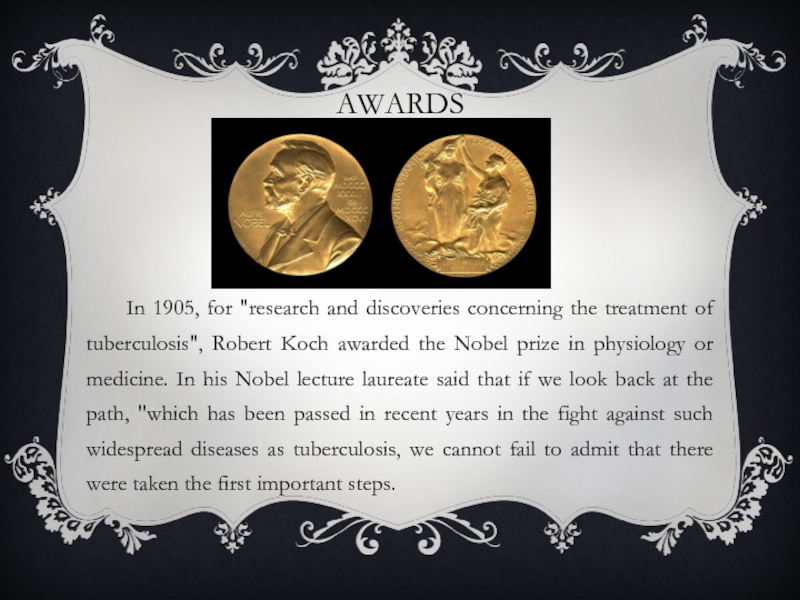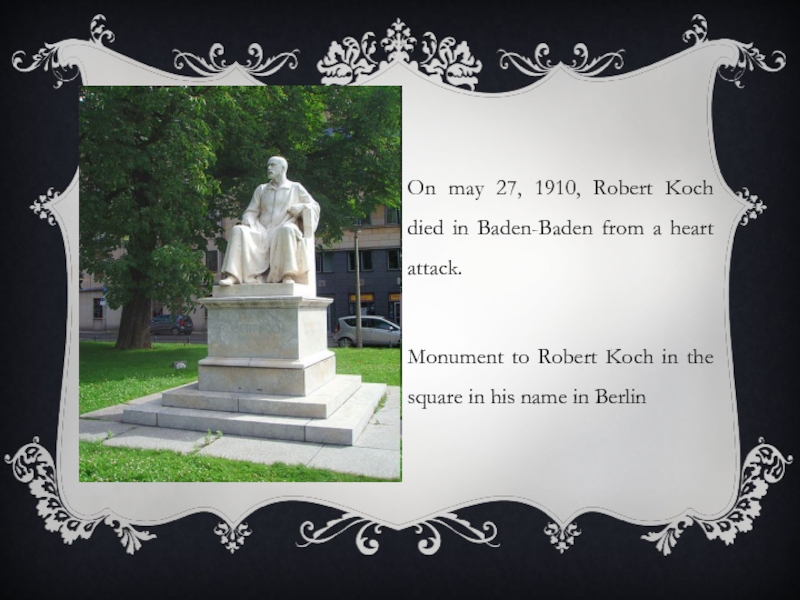- Главная
- Разное
- Образование
- Спорт
- Естествознание
- Природоведение
- Религиоведение
- Французский язык
- Черчение
- Английский язык
- Астрономия
- Алгебра
- Биология
- География
- Геометрия
- Детские презентации
- Информатика
- История
- Литература
- Математика
- Музыка
- МХК
- Немецкий язык
- ОБЖ
- Обществознание
- Окружающий мир
- Педагогика
- Русский язык
- Технология
- Физика
- Философия
- Химия
- Шаблоны, фоны, картинки для презентаций
- Экология
- Экономика
Презентация, доклад по английскому языку на тему: Роберт Кох
Содержание
- 1. Презентация по английскому языку на тему: Роберт Кох
- 2. ROBERT KOCH
- 3. Heinrich Hermann Robert Koch (it. Heinrich Hermann
- 4. Robert Koch was born on December 11,
- 5. In 1862 Koh graduated from high school
- 6. In 1866 Robert finished her studies in
- 7. In 1870 begins the Franco-Prussian war, and
- 8. In 1871 Koch was demobilized. On dvadtsatisemiletny
- 9. SIBERIAN ULCERKnowing about the experiences of Louis
- 10. In 1876 and 1877, with the assistance
- 11. In 1881 Koh publishes the work "Methods
- 12. TUBERCULOSIS Later Koh attempts to find the
- 13. However, despite the abundance of material,
- 14. Mycobactérium tuberculósis, Koch's Bacillus (ILO, BK)- type
- 15. The study Koch tuberculosis was interrupted when
- 16. In 1885 Koch became a Professor at
- 17. AWARDS In 1905, for "research and discoveries concerning
- 18. On may 27, 1910, Robert Koch died
ROBERT KOCH
Слайд 3 Heinrich Hermann Robert Koch (it. Heinrich Hermann Robert Koch; December 11,
1843, Clausthal-Zellerfeld - may 27, 1910, Baden-Baden) - German microbiologist. Opened the Bacillus of anthrax, Vibrio cholerae and the tubercle Bacillus. For research of tuberculosis awarded the Nobel prize in physiology or medicine in 1905.
Слайд 4Robert Koch was born on December 11, 1843 in Clausthal-Zellerfeld, in
the family Herman and Matilda Henrietta Koch. Was the third of thirteen children. Father - mining engineer, I worked in the local mines. The mother, the daughter of an official of Henry Andreas Bevanda, chief inspector of the Kingdom of Hanover. He saw a curious grandson makings of a researcher. In 1848 went to the local primary school. At this time, already knew how to read and write.
Well after school, Robert Koch in 1851 entered the gymnasium of Clausthal.
Well after school, Robert Koch in 1851 entered the gymnasium of Clausthal.
Слайд 5 In 1862 Koh graduated from high school and then arrives at
the famous scientific traditions of the Gottingen University. There he studies physics, botany, and then and medicine. The most important role in shaping the interest of the future of the great scientist to research played many of his professors, including anatomist Jacob Henle, physiologist Georg Meissner and Clinician Charles of Hesse.
Гёттингенский университет имени Георга-Августа
Слайд 6 In 1866 Robert finished her studies in the University and receive
a diploma. From this time he starts working in various hospitals, and at the same time, unsuccessfully trying to organize a private practice in five different cities of Germany. Later he wants to become a military doctor or to travel around the world as a ship's doctor, while finally are not established in the city Require, where he began his medical practice as an assistant in the hospital for the insane.
In 1867, he married Emma Adelfina Josephine Fraz.
In 1867, he married Emma Adelfina Josephine Fraz.
Слайд 7 In 1870 begins the Franco-Prussian war, and work Koch in the
hospital is interrupted. Koh voluntarily becomes a doctor field hospital, in spite of strong short-sightedness. The new service, he gets a big practical experience in dealing with the treatment of infectious diseases, in particular cholera and typhoid. At the same time studying under a microscope algae and large microbes, improving his skills in microphotography.
Слайд 8 In 1871 Koch was demobilized. On dvadtsatisemiletny wife presented him with
a microscope, and since then Robert whole days spent at him. He loses all interest in private medical practice, and began to carry out research and experiments, which gets a large number of mice.
In 1872 Koch is assigned to the district health officer in Wolstein. He found that around Volshteyna among cattle and sheep disseminated endemic disease, anthrax, which affects the lungs, causes carbuncles skin and change the lymph nodes.
In 1872 Koch is assigned to the district health officer in Wolstein. He found that around Volshteyna among cattle and sheep disseminated endemic disease, anthrax, which affects the lungs, causes carbuncles skin and change the lymph nodes.
Слайд 9SIBERIAN ULCER
Knowing about the experiences of Louis Pasteur on animals, patients
with anthrax, Koh using a microscope studies of pathogen, which, presumably, causes anthrax. After a series of experiments, he States that the only cause of the disease is the bacterium Bacillus anthracis, and examines its biological cycle of development. Sets the epidemiological features of the disease. This research was first proved bacterial origin of the disease.
Слайд 10 In 1876 and 1877, with the assistance of botany Ferdinand Cohn
and the pathologist Julia Congame at the University of Breslau (now the Polish city of Wroclaw) publishes articles Koch on problems of anthrax. These works brought him fame. Koh publishes a description of their laboratory methods, including painting bacterial culture and microphotographs of its structure. The results Koch were presented to the scientists of the laboratory of Konheim, including Paul Ehrlich.
Work Koch bring him fame and in 1880, thanks to the efforts of Konheim, Koh becomes a government adviser in the Imperial Department of health in Berlin.
Work Koch bring him fame and in 1880, thanks to the efforts of Konheim, Koh becomes a government adviser in the Imperial Department of health in Berlin.
Paul Ehrlich
Слайд 11 In 1881 Koh publishes the work "Methods of study of pathogenic
organisms" ("Methods for the Study of Pathogenic Organisms"), which describes a method of growing microbes on firm nutrient mediums. This method was essential to isolate and study the pure bacterial cultures. After that, between Koch and Pasteur - until this time leader in Microbiology - a fierce debate. After Koh published a highly critical reviews of the Pasteur research anthrax, leadership last staggered, and between the two outstanding scientists flashes enmity lasting several years. All this time they are locked in bitter disputes and discussions on the pages of magazines and in public speeches.
Слайд 12TUBERCULOSIS
Later Koh attempts to find the cause of tuberculosis, the disease
at the time of widespread and is the primary cause of death. The proximity of the clinic Charite, filled tuberculosis patients that makes it a task - it daily, early morning comes to the hospital where he receives material for research: a small amount of sputum or a few drops of blood of patients with tuberculosis.
The Institute of Microbiology at Dorotheenstrasse in Berlin - here Robert Koch discovered the cause of tuberculosis
Слайд 13
However, despite the abundance of material, he still does not
detect the pathogen. Soon Koh understands that this can be accomplished only with the help of dyes. Unfortunately, conventional dyes are too weak, but after several months of unsuccessful job he still manages to find the necessary substances. Pounded tuberculosis fabric 271 on drug Koh colors in methyl the blueprint, and then in caustic red-brown paint used in the decoration of the skin, and discovers a tiny, slightly curved, bright blue colored sticks - sticks Koch. on March 24, 1882, when he announced that managed to isolate the bacterium that causes tuberculosis. At that time the disease was one of the main causes of mortality.
Слайд 14Mycobactérium tuberculósis, Koch's Bacillus (ILO, BK)- type of mycobacteria described March
24, 1882 Robert Koch (March 24, who declared the world day against tuberculosis).
Слайд 15The study Koch tuberculosis was interrupted when he is on assignment
of the German government as part of a scientific expedition went to Egypt and India to try to determine the cause of cholera. Working in India, Koch announced that he identified the microbe that causes the disease - Vibrio cholerae.
Слайд 16 In 1885 Koch became a Professor at the University of Berlin
and Director of the newly created Institute of hygiene. At the same time he continues the research of tuberculosis, focusing on finding ways to treat the disease.
Слайд 17AWARDS
In 1905, for "research and discoveries concerning the treatment of tuberculosis",
Robert Koch awarded the Nobel prize in physiology or medicine. In his Nobel lecture laureate said that if we look back at the path, "which has been passed in recent years in the fight against such widespread diseases as tuberculosis, we cannot fail to admit that there were taken the first important steps.
Слайд 18
On may 27, 1910, Robert Koch died in Baden-Baden from a
heart attack.
Monument to Robert Koch in the square in his name in Berlin
Monument to Robert Koch in the square in his name in Berlin
